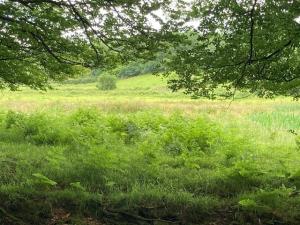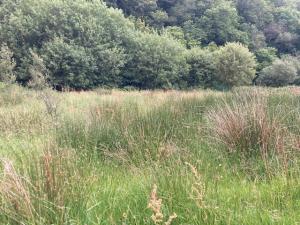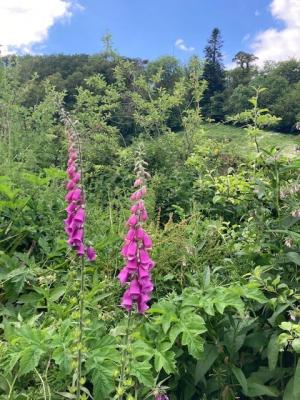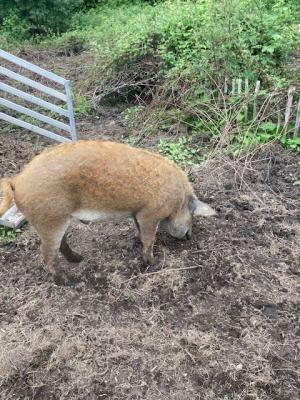Impact Update: Regenerative Agriculture on Dartmoor
Phase 1:
In Dec 2020, DEF awarded a grant to Nick Viney, a regenerative farmer on Dartmoor, to conduct research among her neighbours to explore cooperating with them, at landscape scale, to manage the land in more nature-friendly ways, and create nature corridors in two neighbouring river catchments on the high moor.
Here are some highlights that she discovered in phase 1 of the project: listening to her neighbours to uncover opportunities for improvement…
- The survey questioned 20 x Land Managers in total (10 x farmers/10 x other land managers), covering approx. 8500acres, 3500H (85% conventional farming, 15% other land managers).
- The most popular livestock held were sheep, followed by cows.
- Most of the farmers grazed in conventional/extensive ways that can be detrimental to soil health. The other land managers were more likely to graze in more regenerative ways: bunching grazing animals into smaller areas, for shorter lengths of time, then moving them on so the plants have time to recover, soil microbes are fed, organic matter is trodden in, and soil health is improved.
- There is a need for more farmer education from someone independent that they trust, to share the most up-to-date best practice regarding nature-friendly land management.
- 17 out of the 20 Land Managers questioned said they had experienced flood and/or drought in the last few years.
- There was a lack of understanding that their land would be more resilient to extreme climatic variations in water supply if they focussed on soil health, it’s microorganisms, increasing soil organic matter, and improving water use efficiency and the sequestration of carbon.
- Most of the land managers incurred most of their operational costs in the winter. Education around practices that allow for longer grazing seasons would lower costs and increase profitability (as well as the health of soil/animals/wildlife).
- The majority of land managers questioned had not heard of the term ‘silvopasture’ – grazing animals among trees – a highly productive grazing system that has multiple benefits particularly given the Devon/high moor climate and topography.
- Most were unaware that trees have an incredibly high nutrient density which is why livestock love to eat them. Most had never used tree hay / hedge trimmings as a mineral supplement/natural wormer.
- Only a couple of the land managers had recently planted trees, but many would be open to planting trees in the catchment to improve flood resilience and create wildlife corridors.
- Most of the land managers regularly flailed their hedges, but those who had ceased this practice, expressed joy at seeing increased wildlife. Allowing hedges to grow taller and wider is one of the quickest and easiest ways to develop better wildlife corridors and improve welfare for grazing livestock.
- None of the land managers had ever had their soil carbon or organic matter measured.
- Most of the land managers believed that nature-friendly farming could cost them more, or take too much time to learn/implement.
- However, the majority agreed that if there was a local market willing to pay a premium for regeneratively produced meat, they would be encouraged to farm that way (see Piper’s Farm).
- The majority of those asked were open to collaborating with their neighbours to qualify for the higher level ELM payment schemes.
- Most questioned expressed that they would be happy to visit a farm sharing nature-friendly farming practices and knowledge. All questioned were happy to be approached again with a follow up.
Read the full report here: Listening to land Managers in the Walkham & Tavy Catchments
Future steps – Phase 2:
Nick Viney would like to come back to DEF in the coming months to seek funding to deliver phase 2 of the project to share knowledge with her neighbouring land managers to help them adopt more nature-friendly practices.
She would work on devising creative ways to approach them (avoiding preaching).
Another aspiration is to connect with demo farms in the area and arrange farm tours so the farmers/land managers can see for themselves how it works.
There is potential to link up with FWAG and WRT events.
Soil health is the most important point to convey, because all health stems from the soil.
Addressing the following will help to rebuild soil health:
- Reframe perceptions of scrub – it’s a valuable habitat.
- There is scope for many more trees and bigger hedges.
- Improving grazing practices will fix the water cycle, carbon cycle, provide clean nutrient dense food, increase biodiversity, and increase productivity.
- Chemical fertiliser and insecticides are detrimental to soil health – and therefore wildlife health, livestock health, and public health. There is a need to embrace farming systems that prioritise soil health at the foundation.
- Opportunity to enlighten the youngest land managers (and persuade the oldest to share how it used to be prior to conventional farming).
- Shift culture/perceptions – ‘tidy’ is not a sign of good farming, it’s destructive. And ‘wildness’, complexity and diversity means nature is healthy and thriving.
- It appears that those who received a formal, conventional, agricultural education might find it hardest to transition to more nature-friendly farming practice, so engaging with Agricultural education providers would prove valuable.
- As Land Managers we need to spend more time with our feet actually on the ground, not on a tractor or even a quad. Taking time to physically connect with the land allows us to observe our environment at close quarters.
The long-term aim is to calculate how much additional nature corridor can be created in these two catchments after 1 year, 3 years, 5 years following Nick’s interventions.


To quote Robin Wall Kimmerer:
“Land is where our responsibility to the world is enacted.”
“Thank you to the Devon Environment Foundation for helping to support this project so far, without your funding, with the challenges of conducting it through Covid lockdowns, I would have almost certainly thrown in the towel! I’d particularly like to thank Naomi Oakley from the Advisory Council for her support and input. It’s clear that widespread uptake of Regenerative Agriculture is our best option for speedy landscape scale nature recovery on Dartmoor and throughout the UK. Although little has changed on the ground in our catchments yet, the process of conducting the questionnaire certainly sowed some seeds and built some bridges.”
– Nick Viney, Regenerative Dartmoor


